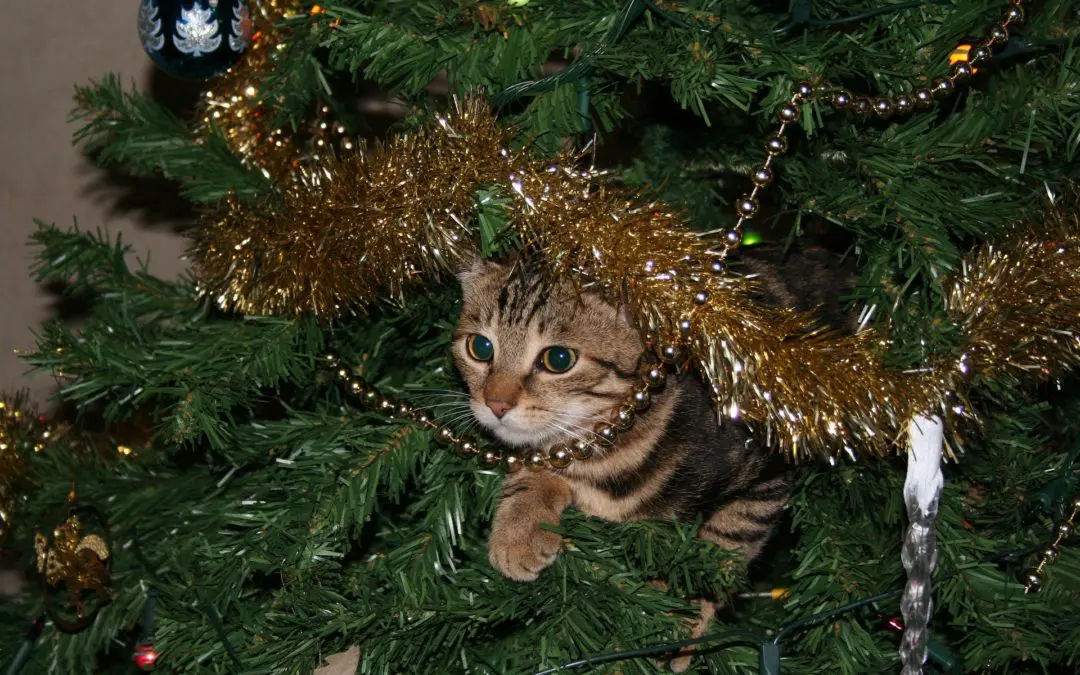It’s the holiday season again! And while this time is filled with cheer and excitement, it can also pose potential risks to our pets. As your local vet in Gilbert, East Valley Animal Hospital would like to share a few pet safety tips for the holidays.
1. Keep Human Food Out of Paws’ Reach
The most common ailment we see in the weeks around the holidays is gastrointestinal (GI) upset. Just like humans, when our pets ingest a food that is not a regular part of their diet, it can lead to GI distress. The most common symptoms include vomiting, diarrhea, bloating, abdominal pain, and gas. In mild cases of diarrhea, a bland diet or specific medication may be recommended to manage the symptoms. When a pet is vomiting, it is important to try to identify the cause of the vomiting as some treatments may exacerbate the condition.
In more severe cases where your pet ingests human food, the pancreas may become inflamed (pancreatitis). Treatment for pancreatitis often requires hospitalization with intravenous fluids. Most pets with gastroenteritis (inflammation in the stomach or small intestine) or pancreatitis make a full recovery—although dehydration associated with either condition can lead to more severe complications, including death.
If your pet is experiencing vomiting, diarrhea or GI distress, it’s best to have them looked at as soon as possible. It’s fun to treat our pets, and around the holidays it’s natural to want to indulge them a bit. But maybe this year you can treat your furry friend to a new toy, another loop around the block or some extra lap time instead.
2. Avoid Decorating with Tinsel, Wire Hangers or Ribbons
Our furry companions are curious creatures. Unfortunately, the ingestion of a foreign object often means a trip to the emergency room with your pet. Tinsel and ribbons are particularly attractive temptations, which, if ingested, can result in a special kind of foreign body called a linear foreign body. If you believe your pet to have ingested tinsel or ribbons, this will be important information to share with your veterinarian. Although linear foreign bodies may not show up on an X-ray, your veterinarian will look for a specific pattern that is consistent with obstruction.
Wire hangers are another hazard that are often used for decoration around the holiday season. Much like bones, wire hangers can penetrate the wall of the stomach or intestine or may cause irritation to the lining of the gut. If penetration has occurred, surgery is often necessary.
3. Pet Proof Your Tree
Whether your family prefers a real or artificial tree, Christmas trees can pose a hazard to pets in several ways. Pets like to eat the needles which may upset the stomach. Vomiting is not uncommon after any plant ingestion (similar to when pets vomit after eating grass). One way to avoid this common issue is to vacuum around the tree regularly.
Pets may also want to drink the water at the base of a real tree which can pose a fire hazard if the tree becomes dry. And remember Clark Griswold in the movie Christmas Vacation? Pets may also try to climb the tree, or may accidentally knock the tree over causing injury to themselves or bystanders. Make sure your tree is secure in its stand and check the water supply daily.
4. Clean up Toys and Small Parts
Just like with children, it’s important to watch pets around small toys to avoid accidental ingestion. Some objects, if ingested, will pass through the gastrointestinal system within a few days. If an object is having a hard time moving through, vomiting and/ or diarrhea is usually the first symptom. An X-ray will help to determine if an obstruction is present.
5. Create a Stress-Free Environment for Your Pet
We all love to have a house full of family and friends during the holidays. But your pet may be used to a routine, and having that routine upset by noise and activity in the house may be stress-inducing. If your pet suffers from anxiety, chances are you already know and are prepared. However, if you encounter unwanted behaviors during the holidays (excessive barking, pacing, restlessness, or inappropriate behaviors) talk to your veterinarian. We may be able to help you put your pet’s mind at ease with simple things you can do at home or with holistic treatments such as Adaptil, a stress reliever that ends “comforting messages” to help puppies and dogs feel calm and relaxed in stressful situations.
If your pet suffers from extreme anxiety, you may choose to use anti-anxiety medications for the holiday season. Don’t wait to start them if you are expecting a full house as it may take 30 days to reach full effect. Anti-anxiety medications are not safe for all pets, so speak with your veterinarian about the risks and side effects first. If your community does fireworks for New Year’s Eve, you may consider a sedative as an alternative to the longer-acting anti-anxiety medications. Talk to your veterinarian to decide what’s best for you and your pet.
Preventative Pet Care in Gilbert
Where holidays are concerned, often an ounce of prevention is worth a pound of cure. Take a few steps to pet-proof your holidays and avoid a trip to the veterinarian. In the case of an emergency, our compassionate and caring veterinarians are standing by to offer treatment for your pets in Gilbert, Chandler and Mesa.
Images used under creative commons license – commercial use. Image by Paul Nicholson from Pixabay (12/13/2019)

